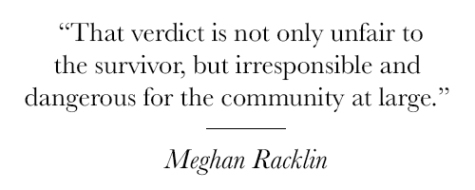The Hearing
December 4, 2014
By the time a case reaches the University Judicial Panel, it has already gone through two NYU offices. The first step in the process is when a survivor, or “complainant,” registers a complaint with the university. This can be done in multiple ways, such as walking into the office of Mary Signor, executive director of NYU’s Office of Equal Opportunity and Title IX representative, or filling out an online form requesting a callback.
“That student will be contacted within 48 hours by our office,” Signor said. “It’s usually a lot sooner, I’d like to say probably within three hours, when I receive it.”
If the complainant names a perpetrator, or “respondent,” and decides to proceed with the investigation, the OEO will contact the respondent.
After the outreach, the OEO conducts an investigation. The investigators collect evidence and, at their discretion, reach out to the people that the complainant and respondent have named as potential witnesses.
Sweeney named five witnesses, all of whom were present at the time of either the initial assault or subsequent harassment. She does not know how many of these were contacted by university investigators.
Four refused to comment and one did not respond to WSN requests.
After the investigation is completed, the investigators relay their preliminary conclusions and recommendations to the Office of Community Standards, which takes over as the office in charge of the judicial portion of the process.

NYU director of Community Standards and Compliance Thomas Grace said after the investigation, the office meets with the accused student.
“We sit with that person, and based on past practices in the university, based on what we believe we’ve learned happened, that person is offered a set of terms, by which the university proposes to resolve it,” Grace said.
If the accused does not accept any of these terms, the matter goes to a University Judiciary Hearing. Olsen rejected the terms Grace offered him and the matter went to the hearing.
Sweeney was not physically present at the University Judicial Panel hearing on March 25 due to her medical leave, but was present over the phone. Sweeney did not have a lawyer.
“I just had myself, and that was probably something that maybe was part of why it was so unpleasant,” she said. “They told me that I could have a lawyer present, but we couldn’t really afford to be paying a lawyer for that whole business.”
Olsen was present, and had hired a criminal defense lawyer.
The panel that heard the case comprised the dean’s representative Sherry Glied, Faculty Senate representative Achiau Ludomirsky, Student Senate representative Kevin Jones and Administrative Management Council representative Levon West. Citing the Family Educational Rights and Privacy Act, Glied, Jones and West declined to comment. Ludomirsky did not respond to requests for comment.
WSN also did not have access to all the details of the hearing because of Olsen’s FERPA rights.
Grace said a member selected by each of these four groups was the standard structure for a university judicial panel up until the restructuring specified in the university’s newest sexual assault policy, which went into effect on Oct. 1, 2014.
Now, a panel is made up of three members, taken from a pool of administrators and faculty members that have been vetted by the university. If the OCS decides that there is a specific conflict of interest that would not allow for a panel to make a fair decision, an external adjudicator, who is not affiliated with the university, hears the case.

William Miller, a member of the NYU General Counsel’s office who participated in the drafting of the new policy, explained the decision to exclude students from serving in judiciary panels.
“There are various guidelines from the federal government that are issued by the Department of Education, and within that, recently, in April of this year, they issued guidelines which specifically said they strongly discourage schools from having students on the panels,” Miller said.
Meghan Racklin, a junior and the president of the NYU Feminist Society and treasurer of Students for Sexual Respect, was in disbelief when she was informed of the one-semester suspension.
“In light of the fact that research says that the overwhelming majority of campus rapes are perpetrated by repeat offenders, that verdict is not only unfair to the survivor, but irresponsible and dangerous for the community at large,” Racklin said. “The notion that a panel of people who are responsible for the well-being of the campus community would let this person back on campus is ridiculous.”
Under school policy, Olsen was found guilty of non-consensual sexual intercourse, but he was found not responsible for the allegations of harassment and intrusion into Sweeney’s bed.
